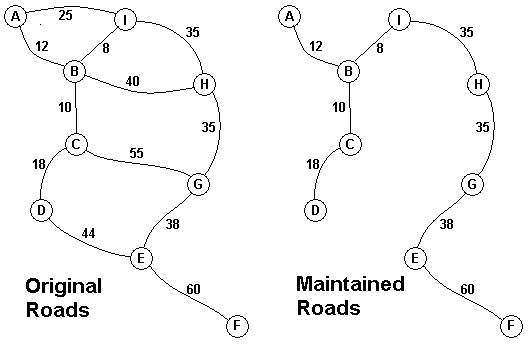POJ1251 ZOJ1406 HDU1301 UVALive2539 Jungle Roads【Kruskal演算法+並查集】
阿新 • • 發佈:2019-01-05
| Time Limit:1000MS | Memory Limit:10000K |
| Total Submissions:30648 | Accepted:14347 |
Description

The Head Elder of the tropical island of Lagrishan has a problem. A burst of foreign aid money was spent on extra roads between villages some years ago. But the jungle overtakes roads relentlessly, so the large road network is too expensive to maintain. The Council of Elders must choose to stop maintaining some roads. The map above on the left shows all the roads in use now and the cost in aacms per month to maintain them. Of course there needs to be some way to get between all the villages on maintained roads, even if the route is not as short as before. The Chief Elder would like to tell the Council of Elders what would be the smallest amount they could spend in aacms per month to maintain roads that would connect all the villages. The villages are labeled A through I in the maps above. The map on the right shows the roads that could be maintained most cheaply, for 216 aacms per month. Your task is to write a program that will solve such problems.
Input
Output
Sample Input
9 A 2 B 12 I 25 B 3 C 10 H 40 I 8 C 2 D 18 G 55 D 1 E 44 E 2 F 60 G 38 F 0 G 1 H 35 H 1 I 35 3 A 2 B 10 C 40 B 1 C 20 0
Sample Output
216 30
Source
問題描述:(略)
問題分析:
這是一個最小生成樹的為問題,解決的演算法有Kruskal(克魯斯卡爾)演算法和Prim(普里姆) 演算法。
程式說明:
本程式使用Kruskal演算法實現。有關最小生成樹的問題,使用克魯斯卡爾演算法更具有優勢,只需要對所有的邊進行排序後處理一遍即可。程式中使用了並查集,用來判定加入一條邊後會不會產生迴圈。程式中,圖採用邊列表的方式儲存,排序一下就好了。
這個題的時間問題並不突出,用C++的輸入輸出也可以通過。
AC的C++語言程式如下:
/* POJ1251 ZOJ1406 HDU1301 UVALive2539 Jungle Roads */
#include <iostream>
#include <algorithm>
using namespace std;
const int N = 26;
int f[N + 1];
void UFInit(int n)
{
for(int i = 1; i <=n; i++)
f[i] = i;
}
int Find(int a) {
return a == f[a] ? a : f[a] = Find(f[a]);
}
bool Union(int a, int b)
{
a = Find(a);
b = Find(b);
if (a != b) {
f[a] = b;
return true;
} else
return false;
}
struct Edge {
int u, v, w;
} edges[N * (N - 1)];
bool cmp(Edge a, Edge b)
{
return a.w < b.w;
}
int main()
{
int n, m, d, cnt2;
char start, end;
while(cin >> n && n) {
UFInit(N);
cnt2 = 0;
for(int i = 0; i < n - 1; i++) {
cin >> start >> m;
for(int j = 1; j <= m; j++) {
cin >> end >> d;
edges[cnt2].u = start - 'A' + 1;
edges[cnt2].v = end - 'A' + 1;
edges[cnt2++].w = d;
}
}
// Kruscal演算法
int ans = 0;
sort(edges, edges + cnt2, cmp);
for(int i = 0; i < cnt2; i++)
if(Union(edges[i].u, edges[i].v))
ans += edges[i].w;
// 輸出結果
cout << ans << endl;
}
return 0;
}
